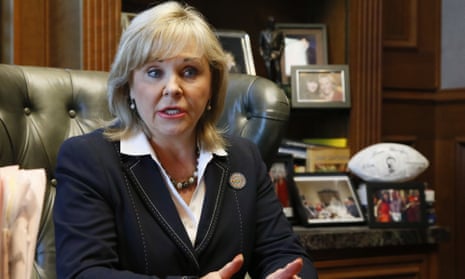The Republican governor of Oklahoma, Mary Fallin, pleased gun control campaigners and angered gay rights groups on Friday, when she vetoed a bill that would have allowed adults to carry handguns without a permit and signed another that permits religious organizations to exclude same-sex couples from adoptions.
The twin actions followed a tumultuous session of the state legislature that saw striking teachers march on the capitol, prompting lawmakers to raise taxes including on the state’s powerful oil and gas industry, to fund increases in education spending.
Announced late on Friday, Fallin’s veto and signature were among more than a dozen decisions taken by the term-limited governor as she clears the decks in her waning months in office.
The veto of the gun bill dealt a rare blow to the National Rifle Association in a conservative state. The proposal to authorize adults to carry firearms without a permit or training was opposed by law enforcement officials, who said it would weaken background checks and hurt public safety.
In a statement, Fallin stressed her support for the second amendment and the right to bear arms and noted she had signed concealed and open carry measures in the past.
“I believe the firearms laws we currently have in place are effective, appropriate and minimal,” she said.
The bill is similar to so-called “constitutional carry” legislation adopted in a dozen other states. The NRA blasted Fallin for what it said was ignoring her promise when she ran for re-election in 2014 to support a constitutional carry gun law.
“Make no mistake, this temporary setback will be rectified when Oklahoma residents elect a new and genuinely pro-second amendment governor,” said Chris Cox, NRA executive director for legislative affairs.
Fallin is in her second four-year term. Several Republicans running to succeed her had called on Fallin to sign the measure.
The adoption decision also prompted an angry response, this time from LGBT groups, who said it was a license to discriminate against gays and lesbians. The bill written by the Republican senator Greg Treat provides legal protections to faith-based agencies that will not place children in LGBT homes because of religious or moral convictions or policies.
The Family Equality Council, which advocates for LGBT families, said the law allows religious groups “to discriminate on the basis of their belief that LGBT people should not be raising children”.
Freedom Oklahoma, another LGBT advocacy group, threatened to sue the state.
“Make no mistake, we will fight for the most vulnerable Oklahomans targeted by this law. Our message to Governor Fallin and the lawmakers who championed this travesty is simple: We’ll see you in court!” said executive director Troy Stevenson.
Fallin’s action drew support from Oklahoma’s Catholic bishops. “The new law will bring more adoption services to the state and allow crucial faith-based agencies to continue their decades-long tradition of caring for Oklahoma’s most vulnerable children,” the bishops said in a statement.
The adoption law goes into effect on 1 November.
In a third decision, Fallin vetoed a bill that would have allowed the state to sentence some juveniles to life in prison without parole. The US supreme court ruled in 2012 that juveniles should not be imprisoned for life without the chance for parole except in rare cases. Fallin said she vetoed the proposal because she believes it violates that high court decision.
Oklahoma has at least 41 inmates serving no-parole sentences for crimes committed when they were 17 or younger.
